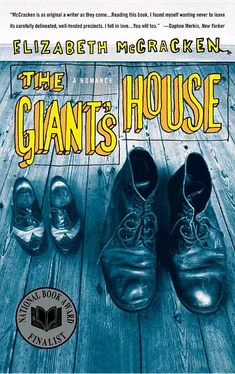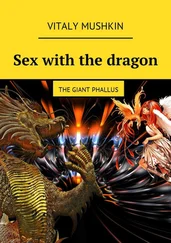I offered to let him drive, but he said he was too distracted. Not distracted enough, however, that he could not criticize with his newfound knowledge of the road. I was a careful driver. Still I could hear him sputter in the back.
We got there at nine, an hour before the store opened, so that James could get settled and get his feet measured for a new pair of shoes; the old ones, he said, were hard to get on in the morning. That was the only way he could tell he’d outgrown them: the difficulty in getting them on first thing, off at night. Sometimes he slept in his shoes, he told me. Between the size of his feet and the distance they were from his arms, it was easier that way.
“Get Oscar to come over,” I said.
“Too much trouble.”
They’d decorated the front of the store with balloons, streamers. A huge shoe took up most of the window display; just like James’s, though made years before, so smaller. A middle-aged man in a suit leaned on the short brick wall that held up the shop windows.
“Jim,” he said, standing up, holding out his hand. “Hugh Peters. President of the chain.” True enough, he was wearing beautiful shoes, rich and red as porterhouse steaks. “Glad we finally coaxed you out here.”
“Nice to meet you, sir.”
You could see Hugh Peters trying his best not to notice James’s height. He shook his head and laughed. “How tall are you, exactly?”
“It’s been a while since I’ve checked,” said James. He smoothed his new shirt.
“About?”
“Eight feet two, last time I was measured.”
“But still growing?”
“So far,” said James.
“So you must be the tallest in the world by now. I mean, nobody’s eight feet tall. Am I right? Basketball players aren’t eight feet tall.”
“I don’t know,” said James. “I don’t follow basketball.”
“Well, come on in,” said Hugh Peters.
The shoe store had two doors: regular-sized and child-sized, right next to each other. “Play your cards right,” Hugh Peters said, “and we’ll put in another one for you.”
It looked just like the shoe stores of my youth: boxes stacked along the walls like a puzzle whose point was to extract what you wanted without disturbing the whole pile; slanted stools; gray metal slide measures. Up front there were chrome chairs with shiny red vinyl seats; halfway back, in the children’s section, were identical chairs half the size. From the front the chairs looked like some botched trick of perspective. A wicker basket in the back held prizes for children who’d been good, and probably for those who hadn’t. No customers yet.
“What’s that?” James asked, pointing at a piece of machinery in the back.
“Fluoroscope,” said Hugh Peters. “Like an X ray. Helps us look at the bones of growing feet, figure out what’ll fit ’em best.”
We stood there. James looked around for a wall to lean on or a chair without arms. But the walls were jumbled up with their boxes, and we were standing by the banks of extra-small chairs.
“Would you like to sit down?” I asked him, loud enough for Hugh Peters to overhear.
“Oh,” Peters said. “Well. Didn’t think of that. Those chairs—” He pointed at the adult chairs near the front. “No good?”
James shook his head. “The arms will get in the way.”
“Let me look out back.”
He called over a salesman, and together they went to the storeroom. The salesman came back wheeling an oak desk chair, took a look at James, then wheeled it back.
“Maybe this wasn’t such a hot idea,” James said to me.
“They’ll find something.”
Then Hugh Peters and the salesman came out carrying a desk that matched the chair. Peters had taken off his suit jacket, had flipped his red necktie over one shoulder. The blotter slipped off the top and hit the floor.
“I hope, that this, is fine.” They set the desk down. Peters adjusted his tie, then wiped his shining forehead. “Should be tall enough, right?”
James sat on the edge. “Fine.”
“Well, let’s see. I think we’ll get a pretty big crowd. We’ve done radio, we’ve done the papers. Town’s talking about it. Kids mostly, and parents. So all we need you to do is sit and chat. Mention what you like about the shoes. How they treating you, our shoes?”
“They’re good,” said James.
“They don’t pinch, right? Give you good support?”
“Very good support.”
“Okay, mention that.”
“I will.” James nodded.
“Good support for growing feet — and who’d know better than you, right?”
“Let’s take a gander at your dogs, Jim.” The salesman knelt down. “Let’s see,” he said, looking at the brace that buckled beneath the sole of the shoe, “how does this work?” Then he figured it out, undid it. The brace swung back with a creak. He unlaced James’s high stiff shoe and slipped it off.
Even I could smell it: terrible, acrid. James’s sock was soaked through at the toe. The salesman made a face.
“Wow,” he said. He held on to James’s heel a moment, at a dry spot. Then he said, “Maybe you want to wash your feet, Jim. There’s a sink out back, in the men’s room.”
James looked down at his foot. “Okay. Put the shoe back on?” The man did. “Tie it, too, will you?” The man clearly wanted to get away from that foot as quickly as he could, but he obeyed.
James stood; the unfastened brace clattered against itself. I followed him to the men’s room, which would have been cramped for a regular-sized person.
“Do you want some help?”
“Be quicker that way.” He wedged himself in and sat on the closed lid of the toilet, leaned against the wall.
I knelt down; I had to open the door to give the back half of me room. “Hand ’er over,” I said, and he scooted the foot in my direction. I unlaced the shoe — the salesman had fixed a knot instead of a bow — and slipped it off.
I’d been mad at the salesman at first for what seemed like rudeness, but this close I understood that it must have taken all he had to be that polite. It was what you might expect something dead to smell like, complicated and searing. I tried not to cough.
Then I slipped off his sock and saw that what I had thought was just sweat, just the usual bad manners of boyhood biology, was blood and fluid. His foot was meaty, rubbed wrong by the shoe and by itself. Some places the skin was white, other places pink. Up by his heel his skin was so dry it looked like it would flake off at a touch. The whole thing was cold. His toes were worst: the nails curled around their own toes, or knifed their neighbors, tore them up.
“Jesus Christ,” I heard somebody say. It was the salesman, looking over my shoulder. “Doesn’t that hurt?”
“We’ll be with you in a minute,” I said. “We’re taking care of it.” I got up and turned on the sink, soaked some paper towels through. I pumped some soap from the dispenser into my palm and then let the water flow over it into the sink.
I said, “Are your feet always like this?”
“Sometimes,” said James. His voice was low, and when I looked up he was close to tears. “I can’t feel them,” he said. “How can I know if I don’t feel them?”
“It’s okay,” I said. “We’ll clean them up.” I picked up the wad of paper towels and knelt again.
“I can’t help it. I can’t help it if I don’t know.”
“James,” I said. I held on to his foot. “Just calm down and everything will be fine.” I doubted this. The foot looked infected, and suddenly I realized there was a good chance the other would be just as bad, if not worse. I stuck my head out of the bathroom. “Hey,” I said to the salesman, who was talking to Hugh Peters. “Do you have a bowl, and perhaps a towel, a cloth one?”
Читать дальше












